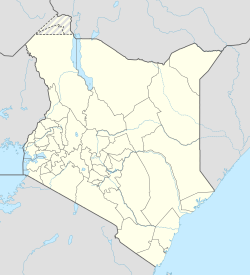Kargi is a village in Marsabit County, located in the north-eastern portion of Kenya. Its about 50 kilometres (31 mi) from Marsabit, and about 430 kilometres (270 mi) from the country's capital, Nairobi.
Kargi | |
|---|---|
Town | |
| Coordinates: 2°30′13″N 37°34′21″E / 2.50361°N 37.57250°E | |
| Country | |
| County | Marsabit County |
| Constituency | Laisamis Constituency |
| Elevation | 427 m (1,401 ft) |
| Population | |
• Total | ~10,000 [1] |
| Time zone | UTC+3 (EAT) |
Infrastructure
editThe town has a mosque, a Catholic church, three primary schools, an all-boys secondary school,[1] and a dispensary. The town also has a water pan to the north. Manyattas, or a group of huts forming a unit within a fence characterise the towns fringes.
Demographics
editKargi is estimated to be made up of 2,064 households, and 26% of its residents can read and write.[2]
Geography
editKargi is located on the Korolle Oasis inside the Chalbi Desert. The oasis and town are a stop for the animals of the Rendille, Gabra and Borana to have a drink.[3]
Climate
editKargi has a Tropical savanna climate. The district's yearly temperature is 26.6 °C (79.9 °F), 4.1% higher than Kenya's average. Kargi typically receives about 130.92 millimetres (5.154 in) of precipitation and has 120.09 rainy days, or 32.9% of the time.[4]
History
editIn 2017, the Kenya Off-Grid Solar Access Project (KOSAP) was launched, which planned to provide energy to 277,000 households (1.3 million people) in remote, low density, and underserved areas of Kenya. It aimed to provide energy to towns like Kargi via mini-grids.[5]
In 2020, residents from Kargi sued the state of Kenya over claims of poisonous materials being dumped in the area by international corporations. One of the companies mentioned being Amoco Petroleum, which explored for oil in the 1980s, and after no success, abandoned the project without properly cleaning. It is reported that the dumping of these materials has caused the deaths of 7,000 animals after contaminating water supplies.[6]
In 2021, World Desertification and Drought Day was held on 17 June, where some 10,000 trees were planted.[3]
Between 2020 and 2023, a drought occurred affecting the region heavily, and causing the deaths of many livestock in the town.[7]
On the 1st of March at 2AM, bandits attacked the town of Kargi, stealing about a 1000 sheep and goats and killing 3, two of which were children aged 7 and 8, and the other was a 35 year old herdsman [8]
References
edit- ^ a b kargipastoralist. https://kargipastoralistlink.org.uk/.
{{cite web}}: Missing or empty|title=(help) - ^ MOHI. "Kargi - MOH".
- ^ a b Joseph Masinde. "World Desertification and Drought Day 2021".
- ^ tcktcktck.org. "Climate of Kargi".
- ^ "KOSAP".
- ^ Muchemi Wachira (29 June 2020). "Residents sue over deaths caused by toxic waste".
- ^ For Kenya’s pastoralists, COP26 promises come too little, too late. https://www.thenewhumanitarian.org/news-feature/2021/11/16/Kenya-pastoralists-COP26-promises-too-little-too-late.
{{cite web}}: Missing or empty|title=(help)CS1 maint: multiple names: authors list (link) CS1 maint: numeric names: authors list (link) - ^ Two Children Among 3 People Killed in Suspected Bandit Attack Within Marsabit. https://allafrica.com/stories/202303010348.html.
{{cite web}}: Missing or empty|title=(help)CS1 maint: numeric names: authors list (link)
